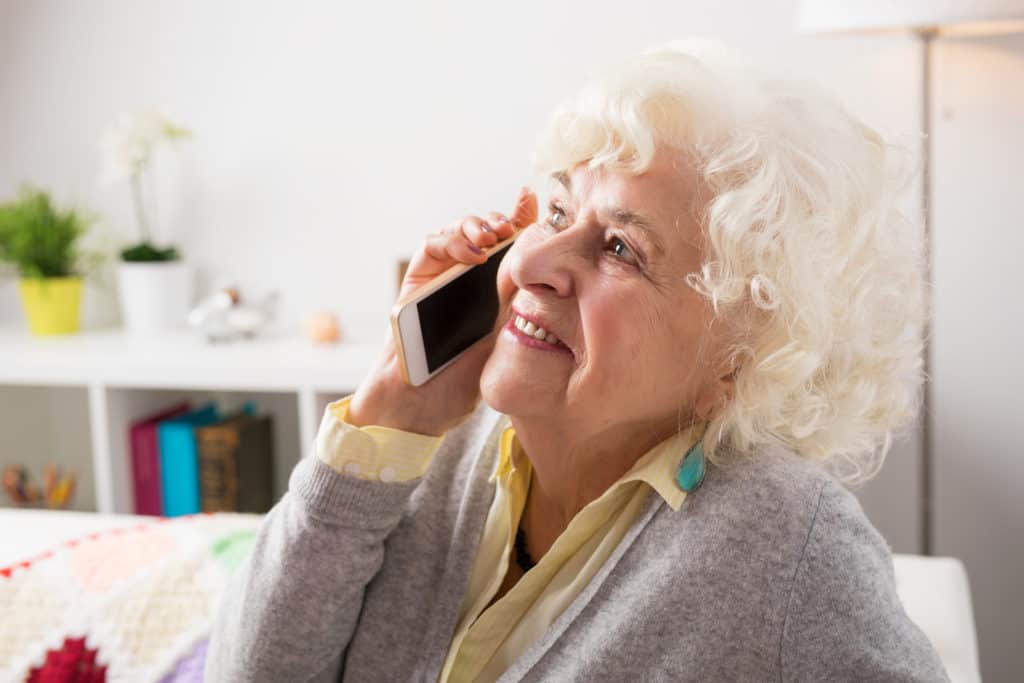Can The Jitterbug Smart2 Have A Tracking App

The Jitterbug phone is arguably one of the most popular phones among seniors and is touted as being very user friendly and practical. It provides a very practical way for seniors to remain independent, but as a caregiver, one question seems to reoccur.
Can you track a jitterbug phone? Simply put, Yes. Jitterbug phones can be tracked provided it has 5Star capabilities. Tracking makes response to an emergency possible should your loved be involved in an accident and require immediate assistance. Tracking will also help EMT services to locate them.
Your loved one's safety is essential, and if they can keep their sense of independence for a bit longer, why not let them do so? I can almost guarantee that they do not want to be taken care of like a child.
So, without pulling up their roots, taking away their privacy, or adding unnecessary tension and stress, you can give them a Jitterbug and let them live freely while still keeping their safety as priority number one.
What is a Jitterbug?
Jitterbug is a type of phone that is designed specifically for seniors to help them keep connected in our every changing the world of technology.
They allow easier access without all the technical difficulties. They provide large screens and large fonts with simple menus so that those without great eyesight or tech-savviness can go through and find what they need easily. Their batteries are long-lasting as well.
Types Of Jitterbug Phones
Jitterbug Smart2

First, there is the Jitterbug Smart2, which is a smartphone with a more simplified menu that makes finding things and use very easy.
It still places all of the coveted technical stuff, even the internet, in the palm of your hand. In other words, you do not compromise on functionality at the expense of ease of use or simplicity.
Classic Flip Phone

Jitterbug also provides the seemingly-outdated but always classic flip phone. However, it has larger buttons and a bigger screen for more comfortable use.
It also has an emergency button in case the user finds themselves in trouble. It is equipped with a flashlight and magnifier if your loved one ever needs one.
5 Star Urgent Response System
The 5Star Urgent Response system allows families to live at ease, knowing that their loved ones are taken care of. It goes with them on any of their devices, particularly phones with it built-in.
Seniors can get help with the push of a button. The biggest selling point though, is the GPS, which makes determining your loved one's exact location possible at any point in time.
They also provide two-way communications with your loved one in an emergency until you can get to them. This helps them feel less alone after a fall, for example. It can also contact family members if needed. However, users do not think that their privacy is impeded in any way.
If you care for a senior, you know the potential for a variety of different accidents and how frequently they can occur. These emergencies can include heart attacks, strokes, or falls.
Some seniors may even be dealing with situations like memory loss that may cause them to wander or get lost, such as Alzheimer's or Dementia.
If your loved one has been diagnosed or has a history of an illness or medical history, be prepared. Start with gathering information. Then, develop open-ended communication on both sides.
Open discussions need to be established with doctors and family members, too. There must be an emergency plan in place to provide quick assistance to the senior(s).

Jitterbug Cellphone Plans
Plans are primarily on a month to month basis – no contract – making it less risky to try. At the time of writing this article, plans as low as $14.99 per month are available.
They also boast of no long distance fees, making calling people all over the United States relatively cheaper.
Unused minutes from any month may be carried over to the next, up to 60 days and thus saving you money in the process.
Some Safety Issues To Consider As A Caregiver
If you are considering a Jitterbug phone for your elderly loved one, then it will be beneficial to consider these other safety measures.
Becoming disoriented and wandering off is not unusual for seniors that have started to developed impaired cognitive functions or memory loss. The follow are some warning signs that you may want to pay attention to.
Potential Warning Signs Of Memory Problems
- They are taking longer to return home from walks or trips to town. It typically means that at some point, they were lost for a short amount of time, delaying their return.
- They forget how to get somewhere they have been to many times before, like stores or family members' homes.
- They refer to their past goals or "to-do" list as their current, such as going to work if they are retired, or getting their baby to bed when their children are grown.
- They are refer to home as somewhere else besides where home actually is.
- Their movements are continuously repeated, such as folding clothes or putting a dish up in the cabinet. Many times, this can seem like they are doing routine housework, when, in fact, they are not doing anything.
- Common rooms are forgotten, such as the bathroom or the kitchen. Places that you know that they know where they are.
- They ask for members of the family or friends that may no longer be around or have passed.
Put A Plan In Place
In order to help prevent wandering or any other emergency, it is crucial to fill the time gaps where things seem stagnant or boring. Have an activity for all times of the day, so that your loved one can live a full life, but also be able to be watched without needing a "babysitter" (as they would refer to it).
- Make a note of all of the times of the day that your senior is active to plan activities and routines. This gives them structure and keeps them busy with a daily plan that can help you help them.
- Know their triggers. What causes them to feel bored, stressed, or restless in some way? If they get bored, they may want to go for a walk and just end up wandering off, lost, and confused.
- Try and refrain from outright correcting or "disciplining" your loved one if they are not "there." They may want to go home (when already be at home), or to work (when they're retired/ unable to work). Communicate with them that, for right now, they cannot go, but maybe they can go the following day (after that moment has passed). Remind them that they are safe, and there is nothing to worry about that you will be there with them.
- Make sure that your senior has everything they need. The less they have to move around and get things for themselves, the less you have to worry about them wandering around without your knowledge. Plus, after a while, when you have gained a bit of a regular schedule, you can typically anticipate when and where they will need to be.
- If you and your senior ever travel anywhere, try and stick to the not-so-busy places. These are loud and overwhelming and can overwhelm your senior family members, making them seek a "safer place."
- Arm them with all the safety items that you can from the Jitterbug phone with 5Star to the Life Alert and a home alarm system that can signal and call in case of emergency. If they are drivers, make sure they have a GPS device that helps track them wherever they go.
Include Everyone In The Plan
When it comes to taking care of your family member, it is helpful to include all of the people who are involved with them. Include neighbors that may live next door and ask them to keep an eye on your loved one.

Make sure they have all of the emergency numbers, as well, so that if anything happens, they can quickly make calls cutting response time down.
Also, be sure to include family members that can call or visit and help with care or activities to keep your loved one busy and give them a sense of fulfillment. Load all these people's numbers into your loved one's Jitterbug, so they can call or be called easily.
Map Everything Out
Know everything about the geographic area around your loved one's home. You need to know where the bodies of water or wooded areas are, but also construction sites and abandoned buildings, that may pose a safety hazard.
If you live near mountains or other larger geographical hazards, you need to have a plan in place.
Be As Knowledgeable As Possible
Listen to the stories your loved one tells you. They tell you stories that mean the most to them. When they are feeling lost, they frequently refer to what they once knew.
This can include jobs, old homes, churches, or other monuments that they have had experience with. If they have a very close connection with an individual, be sure to know where they live as well. It may serve you greatly if you can have an open line of communication in every possible area.
Even with a tracking device, you should know what is around your loved one that is important to them, so you can get there quickly and understand why they went there.
Let Them Live Life
Let them live life independently for as long as possible. Even when their minds and bodies begin to fail them, they still want to feel like adult humans, not children. Plus, you do not want to add more to your plate than what is needed prematurely.
Try and make the most of every moment for as long as you can. Reach out to every support resource and group that is available to you and your loved one. And maybe start with getting them a Jitterbug.
Can The Jitterbug Smart2 Have A Tracking App
Source: https://theinformedsenior.com/track-a-jitterbug-phone/#:~:text=Simply%20put%2C%20Yes.,EMT%20services%20to%20locate%20them.
Posted by: lynntheigh.blogspot.com

0 Response to "Can The Jitterbug Smart2 Have A Tracking App"
Post a Comment